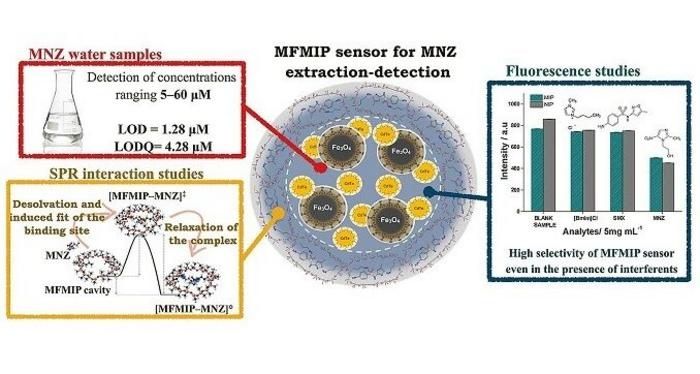Brazilians create sensor to monitor levels of widely used antibiotic in water and food
Advertisement
The device, which combines magnetic fluorescent nanoparticles, was designed at the Center for Development of functional materials, a research center supported by FAPESP and hosted by the Federal University of São Carlos.

The device was tested on water samples, showing good sensitivity and ease of handling
CDMF
Researchers at the Center for Development of Functional Materials (CDMF) describe in the Journal of Molecular Liquids the development of a sensor that detects metronidazole in organisms and the environment. Metronidazole is an antibiotic used in human and veterinary medicine. Accumulation of this drug in the body can result in various health problems, and levels in blood, water, meat and milk, among others, need to be monitored.
The sensor combined magnetic fluorescent multi-functional molecularly imprinted polymers (MFMIP) with a non-imprinted reference composite. Tests on water samples showed good sensitivity and practical advantages such as the possibility of real-time analysis and ease of handling.
CDMF is one of FAPESP’s Research, Innovation and Diffusion Centers (RIDCs) and is hosted by the Federal University of São Carlos (UFSCar).
The first and last authors of the article are Laís Mendes Alvarenga and Luciano Sindra Virtuoso. The other co-authors are Cristiane dos Reis Feliciano, Bruno Giordano Alvarenga, Hauster Maximiler Campos de Paula, Yara Luiza Coelho, Luís Henrique Mendes da Silva, Luiz Fernando Gorup and Mariane Gonçalves Santos.
Original publication
Laís Mendes Alvarenga, Cristiane dos Reis Feliciano, Bruno Giordano Alvarenga, Hauster Maximiler Campos de Paula, Yara Luiza Coelho, Luis Henrique Mendes da Silva, Luiz Fernando Gorup, Mariane Gonçalves Santos, Luciano Sindra Virtuoso; "Preparation of a composite sensor based on a fluorescent and magnetic molecular imprint polymer for metronidazole extraction–detection"; Journal of Molecular Liquids, Volume 390
Most read news
Original publication
Laís Mendes Alvarenga, Cristiane dos Reis Feliciano, Bruno Giordano Alvarenga, Hauster Maximiler Campos de Paula, Yara Luiza Coelho, Luis Henrique Mendes da Silva, Luiz Fernando Gorup, Mariane Gonçalves Santos, Luciano Sindra Virtuoso; "Preparation of a composite sensor based on a fluorescent and magnetic molecular imprint polymer for metronidazole extraction–detection"; Journal of Molecular Liquids, Volume 390
Topics
Organizations
Other news from the department science

Get the food & beverage industry in your inbox
By submitting this form you agree that LUMITOS AG will send you the newsletter(s) selected above by email. Your data will not be passed on to third parties. Your data will be stored and processed in accordance with our data protection regulations. LUMITOS may contact you by email for the purpose of advertising or market and opinion surveys. You can revoke your consent at any time without giving reasons to LUMITOS AG, Ernst-Augustin-Str. 2, 12489 Berlin, Germany or by e-mail at revoke@lumitos.com with effect for the future. In addition, each email contains a link to unsubscribe from the corresponding newsletter.





























































